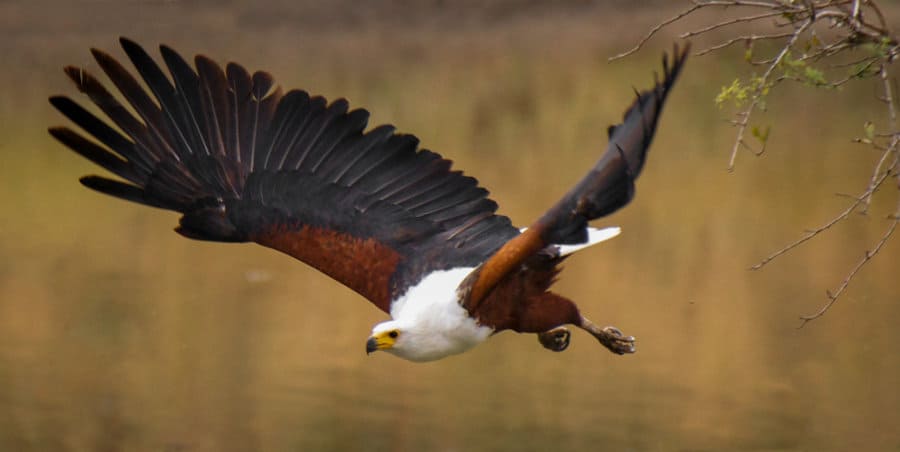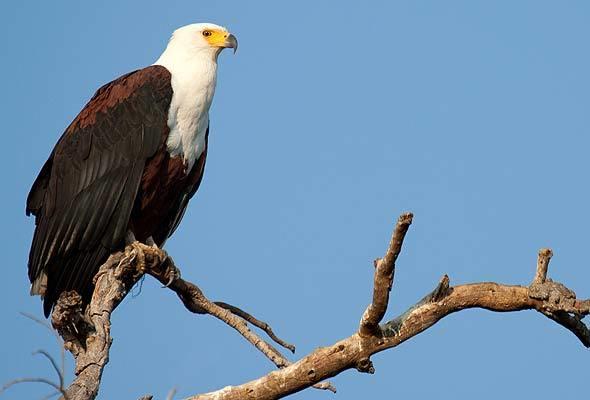

However, they usually remain under an elevation of 1500 m. Individuals have been observed at elevations up to 4000 m.


African fish eagles also frequent stocked dams and alkaline lakes.

( Ferguson-Lees and Christie, 2001 Ferguson-Lees and Christie, 2005)Īfrican fish eagles are found primarily along bodies of water throughout sub-Saharan Africa these include rivers, lakes, floodplains, coasts, estuaries, mangrove lagoons, and swamps. Adults are usually sedentary, but may move about locally in response to changing environmental conditions such as drought, flooding events, or changes in food supply. Generally, African fish eagles can be found between the latitudes of 17°N and 35°S. Non-breeding (wintering) areas are located in southwestern Africa (Namibia, Botswana, and South Africa), parts of central Africa (Cameroon, Equatorial Guinea, Gabon, the Republic of the Congo, and the Democratic Republic of the Congo), and parts of western Africa (Sierra Leone, Guinea, Liberia, Côte d'Ivoire, and Ghana). The sun sets on another glorious day in Africa.Found throughout sub-Saharan Africa, African fish eagles range from Mauritania, Mali, Niger, Chad, Sudan, and Eritrea in the north, to the Atlantic Ocean in the west, the Indian Ocean in the east and to South Africa in the south. With a powerful curl of his wings, he climbs into the pastel sky and flies off into the distance. His talon breaks the mirror of water below him this dam has been his home for some time. The sunlight glints off the water’s surface, as he floats on the warm air, gliding effortlessly. The ‘Voice of Africa’ sounds out a call from his perch before stretching his blackened wings and taking off on the breeze. He is also a kleptoparasite, meaning that he will happily steal the meal off of unsuspecting prey, such as the Goliath Heron and Saddle-Billed Stork. As his name suggests, the African Fish Eagle’s diet consists mainly of fish, though he will happily feast on small birds, ducks, baby crocodiles and even flamingos – if he resides on the salt pans in East Africa. His talons are sharp and large and his feet are barbed to provide better grip on slippery fish. Like other raptors, the African Fish Eagle is designed to catch prey. Of the pair, it is the male’s responsibility to source food when there are chicks in the nest when the reproduction cycle of another year has passed, however, they will each hunt for themselves. Young African Fish Eagles fledge just over the two month mark and will remain close to the nest for a few months more, until they fly off to start a new life cycle in a different territory, with their own mate. This often results in a dominant, larger chick the smallest of the pair is left to compete for resources and often does not survive infancy. Interestingly, the eggs do not hatch at the same time. On average, a breeding pair will incubate two eggs and this is mainly left to the female, who will rotate the eggs throughout the 45 day incubation period to ensure their temperature is evenly maintained. They choose large, strong trees for their mammoth-sized nests and will continue to repair and add on to the existing structure over the years. African Fish Eagles mate for life and return to their nest year-after-year, unless forced to occupy a new territory. Other than their size, they are a matching set. Her wingspan stretches 2.4 metres, while his are slightly shorter at 2m. While the subject of our study on this fine evening, his female counterpart is actually larger than he is. The African Fish Eagle belongs to the Haliaeetus genus of sea eagles, along with six others of its kind four of which can be found on the Indian subcontinent, circling the Himalayan foothills. He is a marvel a part of a history older than that of humans or primates. Characteristic of the species, this African Fish Eagle dons a white head and tail feathers, bright yellow face with a hook-shaped beak and a deep brown body which catches alight with red until it is burnt to black on his wings.


 0 kommentar(er)
0 kommentar(er)
